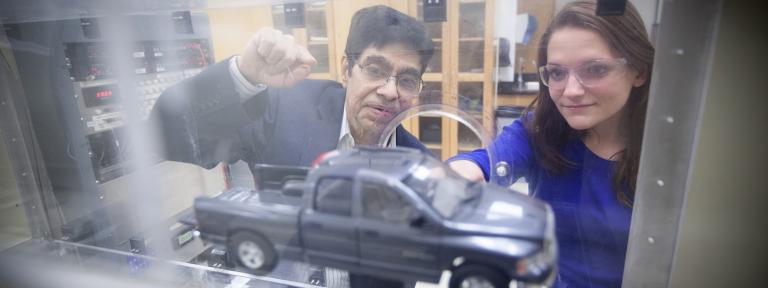
Kettering University is one of only four institutions in Michigan to benefit from educational grants from NextEnergy, a non-profit corporation in Detroit. Kettering will receive $100,000 to further its fuel cell and alternative energy efforts.
Joel Berry from Mechanical Engineering and Kettering's Center for Fuel Cell Systems and Powertrain Integration said it is another sign of Kettering's forward momentum into the alternative energy forum. "We are exceptionally pleased to be awarded these funds to help NextEnergy position our state as a national leader for fuel cell engineering research and education.Mechanical Engineering, as well as faculty from ECE, S&M, and IMEB, look forward to working with the other NextEnergy educational partners for the development of a state wide fuel cell engineering curriculum," he said. "This is simply a great opportunity for all of Kettering to leverage our strong engineering education and automotive heritage to promote the development of fuel cell technology and to educate the next generation workforce."
The board of NextEnergy and Steven D. Arwood, chief operating officer, announced May 28 education grant awards totaling $750,000 to three Michigan universities and one community college. NextEnergy conducted an independent review of the proposals submitted in response to an RFP for the development of a competency based curriculum in Alternative Energy Technology (AET) for accredited associate, undergraduate and graduate degree programs. Continuing education for employees in the science and technology fields will also be a component of the curriculum.
Phase One award recipients are:
Kettering University -- $100,000
Lansing Community College -- $250,000
Lawrence Technological University -- $100,000
Wayne State University -- $300,000
Phase Two, to be conducted in 2004, will be dedicated to the market entry of an AET curriculum and the initial implementation(s). Full implementation and delivery will be the goal of Phase Three in 2005.
"The creation of a curriculum for technicians and engineers is a significant part of the infrastructure that will position the State of Michigan to take the leadership role in producing a workforce to continue AET research and development," said NextEnergy COO Steve Arwood. "The awards are expected to result in a seamless, statewide curriculum in alternative energy between two year and four year schools. It is imperative that students be able to transfer freely from one school to another without the loss of credits."
Education is one of the cornerstones of the NextEnergy strategic plan. Carolyn Upshaw-Royal, Director of Education and Programs for NextEnergy, has begun developing a pilot for K-12 AET curriculum.
NextEnergy is a non-profit corporation founded in October 2002. The NextEnergy Center will be located in the Wayne State University Research and Technology Park, which has been designated an Alternative Energy Renaissance Zone by the City of Detroit. The zone offers up to 20-year state and local tax exemptions for companies that locate and perform alternative energy research, development and manufacturing and education related to alternative energy technology.
NextEnergy dedicated the site for its new facility in December 2002. The facility will incorporate the latest technology in the building's electrical, and heating and cooling systems. The facility's power grid will include the use of fuel cells, advanced international combustion engines, Stirling Engines, as well as Photovoltaics and advanced solar systems. The building will also house laboratory, education facilities, product demonstration areas, office space and interactive space for public understanding of alternative energy.
For more on NextEnergy, visit: www.nextenergy.org.